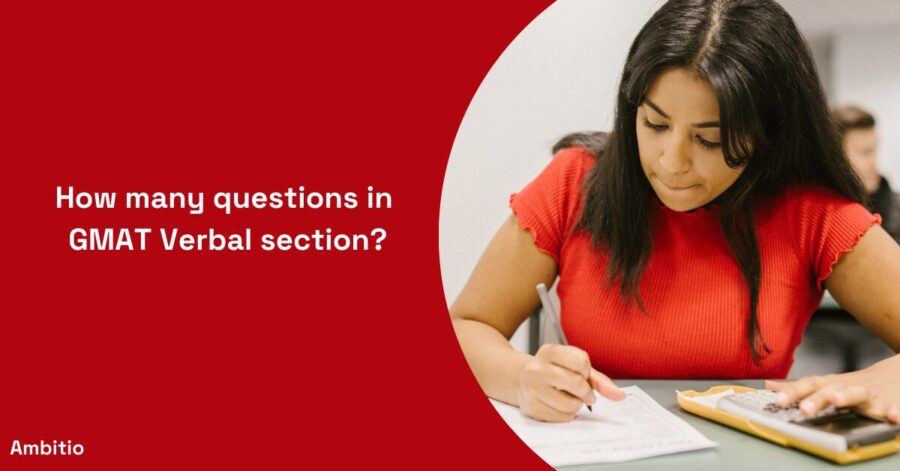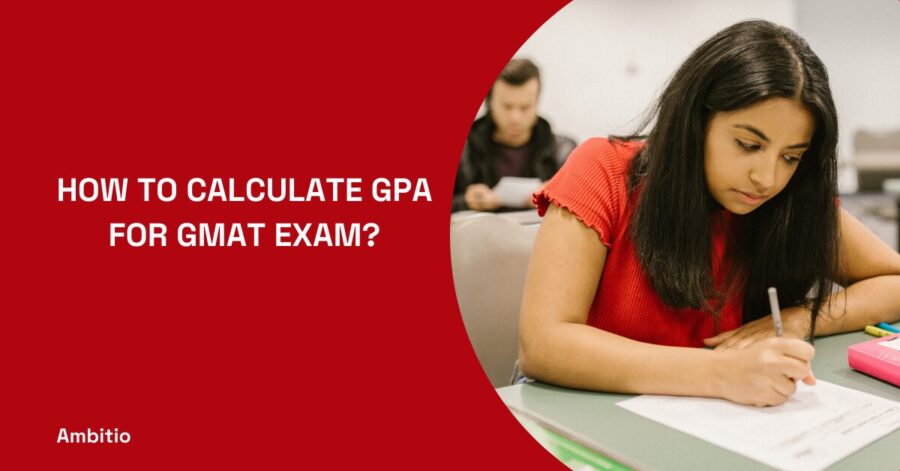11 December 2024
7 minutes read
How many questions in GMAT Verbal section?

Key Takeaways
- Familiarize yourself with Reading Comprehension, Critical Reasoning, and Sentence Correction to navigate the Verbal section effectively.
- Implement effective reading and answering strategies to maximize performance within the 65-minute time limit.
- Regular practice with adaptive tests and reviewing mistakes is crucial for improvement and confidence.
GMAT is a critical component for many aspiring business students. The Verbal section of the GMAT, particularly in the GMAT Focus Edition, plays a pivotal role in assessing a candidate’s ability to understand and analyse written material, evaluate arguments, and correct written English. In this comprehensive blog, we’ll delve into the details of the GMAT Verbal section, exploring its structure, the types of questions you can expect, and tips for effective preparation.
How many questions are there on the GMAT Verbal Reasoning section ?
In the GMAT Focus Edition, the Verbal Reasoning section consists of 23 MCQs and 21 GMAT Quant questions. The Verbal section is one of the three sections of the GMAT, designed to assess your verbal skills. The number of questions is strategically distributed to comprehensively evaluate your verbal skills, ensuring that you can read, understand, and critically analyse written material effectively. The verbal section of the test includes three types of questions:
- Reading Comprehension
- Critical Reasoning
- Sentence Correction
What skills are evaluated in the GMAT Verbal Section?
Firstly, understand the importance of the GMAT test. The Verbal section of the exam is designed to evaluate a range of essential skills required for success in business school and professional environments. These skills include the ability to read, understand, and interpret complex texts, as well as critical thinking and adaptive problem-solving capabilities.
Ability to Read
The GMAT Verbal Section tests a candidate’s ability to read complex texts quickly and efficiently. This involves grasping main ideas, details, and themes within passages, which is crucial for understanding extensive business documents. Know the benefits of taking the GMAT exam before giving it a shot.
Ability to Understand
Beyond reading, this section evaluates the ability to understand the nuances of written material. Candidates must recognize the author’s tone, intent, and assumptions, enabling them to make informed decisions based on the text.
Critical Thinking Skills
Critical thinking skills are a core component of the verbal section. Candidates must analyse arguments, identify logical flaws, and evaluate evidence. This skill is essential for effective problem-solving and decision-making in business contexts.
Ability to Understand and Interpret
Candidates are also tested on their ability to understand and interpret information accurately. This includes recognizing relationships between ideas and drawing logical inferences, crucial for effective communication and analysis in business roles.
Adaptive Nature of the Test
The GMAT Verbal Section is adaptive, adjusting the difficulty of questions based on performance. This ensures a precise assessment of verbal abilities by continuously challenging candidates at their proficiency level.
GMAT Verbal Section – Reading Comprehension

Reading Comprehension questions test your ability to understand and interpret written material unlike the GMAT counting problems. You’ll be given a passage and asked to answer questions based on the content, tone, and implications of the passage. These questions assess your ability to:
- Identify the main idea or primary purpose of the passage.
- Recognize supporting details and understand their significance.
- Draw inferences from the text.
- Understand the logical structure and organization of the passage.
- Evaluate the author’s tone and attitude.
Tips to Master Reading Comprehension Questions
- Active Reading: Engage with the text by highlighting key points, summarizing paragraphs, and noting unfamiliar terms. This keeps you focused and helps retain important information. Follow strategies listed in the GMAT beginner’s guide before starting your preparation for any section .
- Identify the Main Idea: Determine the passage’s main idea or purpose. Understanding the central theme helps answer questions related to the overall message and author’s intent.
- Understand Structure: Notice the passage’s organization—introduction, supporting arguments, evidence, and conclusion. This structure can provide clues for answering questions about the passage’s logic and flow.
- Look for Keywords: Keywords like “however,” “in contrast,” and “for example” signal important shifts. These help you understand the argument and organization better.
- Practice Inferences: Many questions require making inferences. Practice reading between the lines and drawing logical conclusions from the information.
- Time Management: Practice reading passages and answering questions within a set time limit. This helps maintain the pace needed to complete the section.
- Review Mistakes: After practice, review mistakes to understand where you went wrong. This improves comprehension and answering techniques over time.
Sample Question
“Corporate social responsibility (CSR) is a business model in which companies integrate social and environmental concerns in their operations. Companies that practice CSR strive to have a positive impact on society while achieving economic success. CSR initiatives can include efforts to reduce carbon footprints, improve labour policies, and engage in charitable giving.”
Question: What is the primary goal of companies that practice CSR?
Answer: The primary goal of companies that practice CSR is to integrate social and environmental concerns in their operations while achieving economic success.
GMAT Verbal Section – Critical Reasoning
GMAT Critical Reasoning questions of the verbal section evaluates your ability to analyse arguments. These questions typically present a short argument followed by a question that asks you to strengthen, weaken, or draw a conclusion based on the argument. Skills assessed include:
- Identifying the conclusion and supporting evidence.
- Recognizing assumptions underlying the argument.
- Evaluating the strength and validity of the argument.
- Identifying flaws or weaknesses in reasoning.
- Drawing logical conclusions or inferences.
Tips to Master Critical Reasoning Questions
- Understand the Argument: Clearly identify the conclusion and the premises supporting it. This will help you understand the argument’s structure. Analyse previous year’s GMAT critical reasoning questions along with solutions and explanations for better understanding .
- Identify Assumptions: Look for unstated assumptions that are necessary for the argument to hold true. This is key to evaluating the argument’s strength.
- Strengthen or Weaken: Practice finding evidence that would strengthen or weaken the argument. This helps in understanding the argument’s robustness.
- Pre-think: Before looking at the answer choices, predict what a correct answer might look like. This approach can help you focus on relevant options.
- Practice Regularly: Consistent practice with various types of critical reasoning questions will enhance your analytical skills and improve your accuracy.
Sample Question
Premise: “Employees who work from home are 20% more productive than those who work in the office.” Conclusion: “Therefore, the company should allow more employees to work from home.”
Question: Which of the following, if true, would most strengthen the argument?
A. The cost of setting up home offices for employees is high.
B. Employees who work from home take more sick days.
C. Employees who work from home report higher job satisfaction.
D. Working from home reduces the company’s office space requirements.
Answer: C. Employees who work from home report higher job satisfaction.
Explanation: Higher job satisfaction among remote employees strengthens the argument by suggesting an additional benefit of working from home.
It is not just about understanding the concept , but solving as many Verbal critical reasoning questions to get a good hold on it . Choose GMAT books that has practice questions on every section .
GMAT Verbal Section – Sentence Correction
Sentence Correction questions test your knowledge of standard written English and your ability to make sentences clear and grammatically correct. Each question consists of a sentence with an underlined portion. You’ll need to select the best option from the choices provided to correct any errors. Key areas assessed include:
- Grammar and usage (subject-verb agreement, pronoun usage, verb tense, etc.).
- Sentence structure (parallelism, modifiers, etc.).
- Diction and word choice.
- Clarity and conciseness.
- Idiomatic expressions and standard written English conventions.
Tips to Master Sentence Correction Questions
- Understand Grammar Rules: Familiarize yourself with common grammatical rules, including subject-verb agreement, pronoun usage, parallelism, modifiers, and idioms.
- Read Carefully: Carefully read the entire sentence to understand its meaning before evaluating the options. This helps in identifying subtle errors.
- Eliminate Wrong Choices: Use the process of elimination to discard options with obvious errors, narrowing down your choices. This is one of the many ways followed by exam takers in cracking the GMAT exam.
- Consider Conciseness: Choose options that are not only grammatically correct but also clear and concise. Avoid wordiness and redundancy.
- Practice Regularly: Regular practice with Sentence Correction questions will help you recognize patterns and common errors, improving your speed and accuracy.
Sample Question
Original Sentence: The committee has decided to postpone the meeting, and it will be rescheduled next week.
Options: A. The committee has decided to postpone the meeting, and it will be rescheduled next week.
B. The committee decided to postpone the meeting, rescheduling it for next week.
C. The committee has decided to postpone the meeting and rescheduled it for next week.
D. The committee has decided to postpone the meeting, rescheduling it for next week.
E. The committee has decided to postpone the meeting, with it being rescheduled next week.
Answer: D. The committee has decided to postpone the meeting, rescheduling it for next week.
Explanation: Option D is concise and correctly uses the participial phrase “rescheduling it for next week” to provide additional information about the postponement.
How to prepare for the GMAT Verbal section?
Preparing for the GMAT Verbal section requires strategic planning. This section measures your ability to understand and interpret written material, evaluate arguments, and correct written English. Follow the below-mentioned preparation strategies to crack the GMAT adaptive test.
1. Understand the Question Types
The verbal section of the test includes multiple-choice questions across three sections of the GMAT: reading comprehension, critical reasoning, and sentence correction. Knowing the types of questions you get helps you manage time and answer questions correctly.
2. Focus on Reading Comprehension
GMAT RC questions test your ability to understand and interpret passages on a range of topics. You’ll need to answer 3-4 questions per passage, so identifying the main point of the passage quickly is essential. Reading carefully ensures you get correct answers.
3. Develop Critical Thinking Skills
In the critical reasoning section, you must evaluate the argument presented in short arguments. These questions test your ability to analyse and assess information. Practice regularly with many GMAT questions to improve your critical thinking skills.
4. Master Grammar Rules
Sentence correction questions follow specific grammar rules. You need to answer by choosing the best option out of 5 answer choices. Understanding these rules helps you spot errors quickly and answer questions correctly, boosting your GMAT verbal score.
5. Practice Adaptive Testing
The GMAT is a computer adaptive test, meaning the difficulty of questions adapts based on your performance. Answering initial questions correctly increases your chances of a higher score. Use adaptive practice tests to simulate the exam and identify weak areas to focus your prep GMAT efforts effectively.
Conclusion
GMAT Verbal section is a critical component of the test that assesses your ability to understand and analyse written material, evaluate arguments, and correct written English. With 23 questions to be completed in 65 minutes, it requires a blend of reading comprehension, critical reasoning, and sentence correction skills.
By understanding the question types, developing strong reading and analytical skills, mastering grammar rules, and practicing effectively, you can maximize your performance in this section. Prepare strategically before receiving your GMAT admit card.
Transform your GMAT preparation with Ambitio’s expert guidance. Our comprehensive approach includes personalized study plans, adaptive practice tests, and strategic insights, all designed to enhance your understanding and performance across the exam’s quantitative and verbal sections.
FAQs
What is the format of the GMAT Verbal section?
The GMAT Verbal section is computer-adaptive, meaning the difficulty of questions adjusts based on your previous answers.
Can you skip questions in the GMAT Verbal section?
No, you cannot skip questions. You must answer each question to move on to the next.
How are Reading Comprehension questions structured in the GMAT Verbal section?
Reading Comprehension questions are based on passages and test your ability to understand, analyse, and apply information.
How can I improve my score in the GMAT Verbal section?
To improve your score, practice regularly with sample questions, understand the test format, and focus on your weaknesses in Reading Comprehension, Critical Reasoning, and Sentence Correction.
How is the GMAT Verbal section scored?
The GMAT Verbal section is scored on a scale of 0 to 60, which contributes to your overall GMAT score.
What are Sentence Correction questions in the GMAT Verbal section like?
Sentence Correction questions test your grammar, effective writing, and English language proficiency by asking you to choose the best version of a sentence.

You can study at top universities worldwide!
Get expert tips and tricks to get into top universities with a free expert session.
Book Your Free 30-Minute Session Now! Book a call now




























